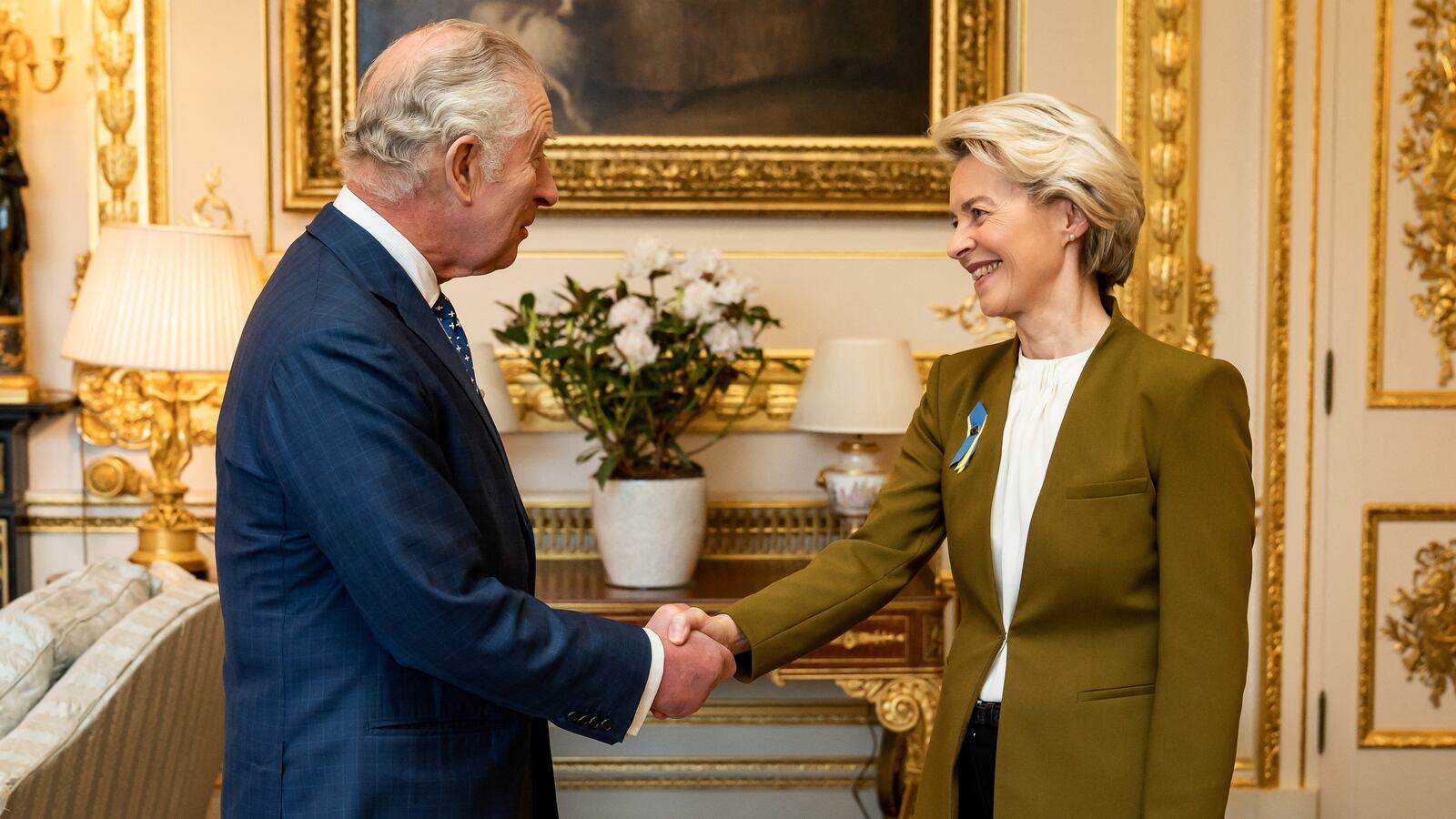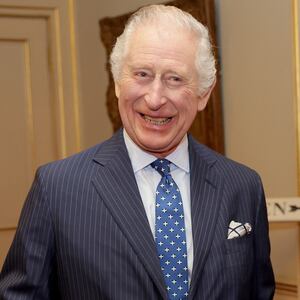Royalist is The Daily Beast’s newsletter for all things royal and Royal Family. Subscribe here to get it in your inbox every Sunday.
It has not taken long in his reign for King Charles III to ignite a firestorm about how he views his future role. By lending his name and his castle to consecrate a controversial political deal he has crossed a line his mother, Elizabeth II, would never have thought of crossing.
The deal signed between his prime minister, Rishi Sunak, and the president of the European Union, Ursula von der Leyen, was vital to clean up the lingering mess of Brexit, particularly its damage to the economy of Northern Ireland.
In a normal world, this deal would have been signed at 10 Downing Street. But this has ceased to be a normal world, and Sunak moved the venue to Windsor, to get the king’s imprimatur as the “Windsor Framework.” That was followed by von der Leyen joining the king for tea at Windsor Castle.
The whole idea was that the two most hostile political factions to the deal, the Democratic Unionist Party in Northern Ireland, and the lunatic fringe of Brexiteers in Sunak’s Tory party, would be more reluctant to attack it if had the royal seal of approval. By going along with this, Charles has torn away one of the few very explicit tenets of the artfully misty British Constitution—that the monarch is always above politics and should never reveal their feelings on any issue. For seventy years his mother meticulously upheld that rule. Now it lies in tatters.
Whose idea was this?
In briefings, both sides—Downing Street and the king’s spokespersons—have said the initiative was the other’s. (This confusion became even more suspect when it was reported that the “tea for two” meeting was requested by von der Leyen.) If neither Downing Street nor the palace was keen to own it, you can be sure that they both suddenly realized that that they had stepped into a minefield without a map.
And, sure enough, a chorus of alarm is shaking the foundations of Westminster. I have to admit that I never imagined the day would come when I could agree with one of the most eccentric and atavistic of Brexit supporters, the former Tory cabinet minister Jacob Rees-Mogg. But he was absolutely spot-on: “The sovereign should only be involved when things have been completed and accepted,” he told GB News. “The king gives assent to acts of parliament when parliament has agreed, he doesn’t express his view on acts of parliament when they are going through the process.”
For example, in 1972, soon after Britain finally negotiated entry to what was then called the European Common Market, Queen Elizabeth was sent to Paris to make nice to the French, who had for years resisted Britain’s admission to the club. She was a smash hit. At a banquet at Versailles she told the French president, Georges Pompidou, “We may drive on different sides of the road, but we are going the same way.”
The queen had followed the rules, and then played her part as only she knew how, to great acclaim on both sides of the Channel.
Charles must be fully aware of the cost to him of ignoring this precedent. After all, whoever dreamed up the idea for the Windsor show, he could have said no.
There are two influences at work on him. The first is his own notion of the need to “modernize” the monarchy. That involves dismantling the overpopulated and over-indulged scale of the royal household and his many free-loading relatives. But – in his eyes – it also involves an ambition to make himself seem more relevant by looking like a progressive influence on British and world politics. (The palace flacks have emphasized that, in his chat with von der Leyen he would display his passion about dealing effectively with climate change.)
The second influence melds with and reinforces the first. By far the most influential voice among those who counsel the king is his private secretary, Clive Alderton. Alderton has worked closely with Charles and Camilla since 2015 (he is credited with the slippery term “recollections may vary” in the queen’s response to charges of racism in the royal household by Meghan and Harry).
Before Alderton joined Charles’s office he was a long-time career diplomat, an unusual background for a private secretary. (The queen’s last private secretary, Edward Young, had been a banker and a media consultant). By all accounts he is a great believer in the “soft power” value of the monarchy—using the head of state to schmooze and mingle with world leaders, as the queen so frequently did.
Indeed, the queen became accepted as a world leader herself and there is nothing that Charles would relish more than enjoying the same status. The trouble is that his mother earned that rank after years of experience and sticking closely to the rules.

British Prime Minister Rishi Sunak walks with European Commission President Ursula von der Leyen at the Fairmont Hotel in Windsor, Britain, February 27, 2023.
Dan Kitwood/Pool via REUTERSAnother sign that Charles has been steered to a role that helps the government more than it helps him is that although his first overseas tour was expected to be to key parts of the British Commonwealth, like Australia, Canada and Africa, he will instead visit Paris and Berlin next month. He’ll have a job explaining and defending an act of self-harm as crazy as Brexit.
The government’s priorities were also behind the first state visit in Charles’s reign for a foreign head of state, by Cyril Ramaphosa, the president of South Africa, in November. On the face of it, this seemed a puzzling choice for the king, as head of the Commonwealth, because South Africa is hardly a role model of good governance. State services like the railways and power grid have fallen apart because of being gutted by corruption. But the British government was more alarmed by watching South Africa fall more and more under the influence of China and Russia, and hoped that a banquet at Buckingham Palace might help to woo Ramaphosa back into the fold. That hasn’t happened.
The king is in a bind. It’s very hard for him to follow such a consummate monarch as his mother. But this is not his mother’s Britain anymore. One of her few missteps came in 2019 when she was conned by the mendacious prime minister Boris Johnson into suspending parliament for six weeks while he was struggling to wrap up Brexit. That move was later ruled illegal by the British supreme court and, as a result, the dying queen loathed Johnson.
This was, however, an omen that the ruling Tory party had become less scrupulous about how it respected the traditional relationship between the monarch, as head of state, and political leaders. This time, Charles seems to have been more of a willing party to their manipulation than his mother was. Sunak shrewdly played to his hunger for a meaningful role. But it might well turn out that the cup of tea he shared with von der Leyen at Windsor Castle was, in fact, a poisoned chalice.







